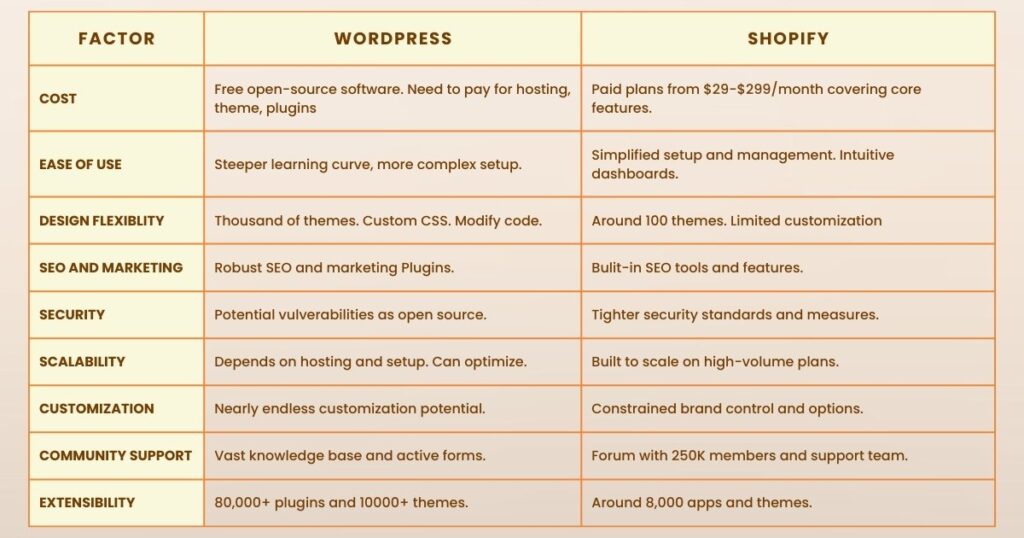
WordPress vs Shopify: Which is Best for You?
Table of Contents
Choosing the right platform to build your online presence is one of the most critical decisions you’ll make for your business. It’s like picking the foundation for a new house—you want it to be strong, reliable, and able to support future growth. For anyone looking to sell products online, the debate often comes down to two titans: WordPress and Shopify.
Both platforms are incredibly powerful, but they serve different needs and are built on fundamentally different philosophies. One offers unmatched flexibility and control, while the other provides a streamlined, all-in-one solution. So, how do you know which one is the perfect fit for you? Let’s break it down.
Understanding the Core Difference
Before we dive into the details, it’s essential to understand what each platform is at its heart.
- Shopify is an E-commerce Platform. It was purpose-built for one thing: selling online. It’s a hosted, all-in-one solution that provides everything you need to launch a store—from a storefront to payment processing and inventory management—in a single, monthly subscription. Think of it as a turnkey business solution.
- WordPress is a Content Management System (CMS). While it can power an online store, its original purpose was to build any kind of website, from blogs to portfolios to corporate sites. To turn a WordPress site into a functional e-commerce store, you need to install a plugin like the popular WooCommerce, which adds the necessary selling features. This makes it a more versatile, but also more hands-on, approach.
The Battle of Ease of Use
This is often the deciding factor for many small business owners and new entrepreneurs.
Shopify: The major selling point of Shopify is its simplicity. The platform is designed to be a “plug-and-play” solution. You sign up, choose a theme, add your products, and you’re ready to start selling. The dashboard is intuitive, and they handle all the technical heavy-lifting like hosting, security, and updates. This means less time spent on the backend and more time focusing on your business.
WordPress: WordPress requires a bit more technical know-how upfront. You’ll need to handle your own hosting (from a provider like Bluehost or SiteGround), install WordPress, and then add your e-commerce plugin. While the process isn’t rocket science, it does involve multiple steps and a steeper learning curve, especially for a complete beginner. However, once you get the hang of it, the level of control is unparalleled.
Flexibility and Customization: Who Reigns Supreme?
This is where the platforms’ core differences truly shine.
WordPress: With over 60,000 plugins and countless themes, WordPress offers nearly limitless customization. You can build anything you can dream of. Want a blog, a forum, a membership site, and an online store all in one? WordPress makes it possible. This freedom is what attracts developers, designers, and businesses with very specific needs. You have full control over your code, your hosting environment, and your SEO strategy.
Shopify: Shopify’s “walled garden” approach means you have fewer customization options. You can use their theme store and app marketplace, but you are limited to what their platform allows. While there are thousands of apps, they can’t match the sheer variety and deep-level customization of WordPress. This can be an advantage for those who get overwhelmed by too many choices, but a limitation for businesses that require unique functionality.
The Cost Factor: A Tale of Two Models
Comparing the costs isn’t as simple as it seems, as the models are completely different.
Shopify: Shopify operates on a clear, tiered subscription model. You pay a monthly fee (starting at $29/month) that includes hosting, security, and access to their platform. This fee is predictable, making it easy to budget. Be aware, however, that they also charge transaction fees unless you use their in-house payment processor, Shopify Payments. Additional apps and premium themes can also add to your monthly bill.
WordPress: The WordPress software itself is free. However, your costs will be a bit more fragmented. You’ll need to pay for web hosting, a domain name, and potentially premium themes or plugins for added functionality. While it can be cheaper in the long run, costs can add up quickly if you need multiple premium plugins or if your traffic demands a more expensive hosting plan. The beauty is you can start small and scale as you grow. For a detailed look at hosting, check out articles on reputable providers like SiteGround.
So, Which One is Best for You? The Final Verdict
The choice between WordPress and Shopify ultimately comes down to your personal goals and technical comfort level.
Choose Shopify if:
- You want to launch an online store as quickly and painlessly as possible.
- You are not technically inclined and want an all-in-one solution that handles hosting and security for you.
- Your primary focus is e-commerce, and you don’t need extensive blogging or other complex website features.
- You value simplicity and 24/7 customer support.
Choose WordPress (with WooCommerce) if:
- You have a bit of technical expertise or are willing to learn.
- You want ultimate control over every aspect of your website and store.
- You plan to have a blog or content-rich site that happens to have an online store attached.
- You want to avoid recurring transaction fees and are comfortable managing your own hosting.
- You have a unique business model that requires a high level of customization.
There’s no single “best” platform—only the best platform for your unique needs. Take a moment to assess your goals, your budget, and your skills, and the right choice will become clear.
More Links:

